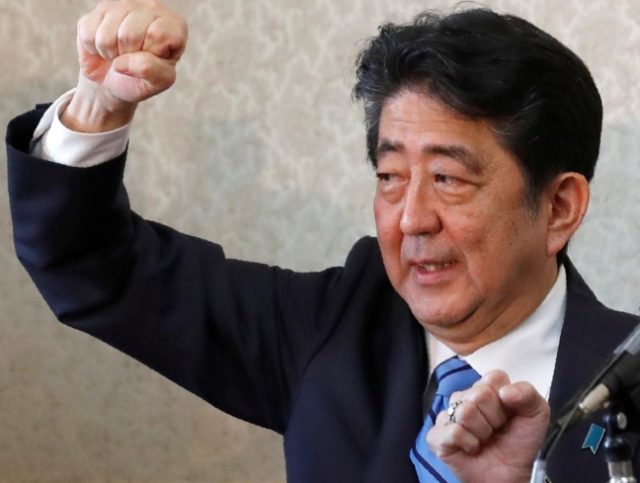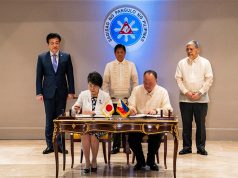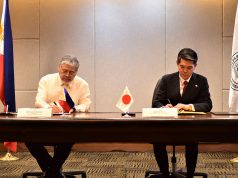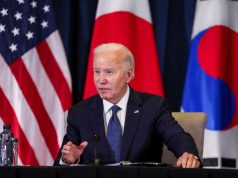TOKYO — Japanese Prime Minister Shinzo Abe’s ruling bloc was headed for a big win in Sunday’s election, exit polls showed, bolstering his clout and potentially reenergizing a push towards his cherished goal of revising the post-war, pacifist constitution.
Abe’s Liberal Democratic Party-led coalition was set to win 311 seats, keeping its two-thirds “super majority” in the 465-member lower house, an exit poll by TBS television showed. Public broadcaster NHK also said the ruling bloc was closing in on a two-thirds majority, although some other broadcasters had the ruling bloc slightly below the two-thirds mark.
A hefty win raises the likelihood that Abe, who took office in December 2012, will have a third three-year term as LDP leader next September and go on to become Japan’s longest-serving premier. It also means his “Abenomics” growth strategy centered on the hyper-easy monetary policy will likely continue.
Final official results are expected early on Monday.
The U.S.-drafted constitution’s Article 9, if taken literally, bans the maintenance of armed forces. But Japanese governments have interpreted it to allow a military exclusively for self-defense.
Backers of Abe’s proposal say it would just codify the status quo. Critics fear it would allow an expanded role overseas for the military.
The LDP’s junior partner, the Komeito, is cautious about changing the constitution, drawn up after Japan’s loss in World War Two. Several opposition parties favor changes, but don’t agree on details. Amendments must be approved by two-thirds of each chamber of parliament and then by a majority in a public referendum.
“Nothing about the process (of revising the constitution) will be easy,” said Tobias Harris, an analyst at Washington-based consultancy Teneo Intelligence. “But we’ll be hearing a lot about it.”
‘National crisis’
Abe had said he needed a new mandate to tackle a “national crisis” from North Korea’s missile and nuclear threats and a fast-aging population, and to approve his idea of diverting revenue from a planned sales tax hike to education and child care from public debt repayment. He called the poll amid confusion in the opposition camp and an uptick in his ratings, dented earlier in the year by suspected cronyism scandals.
Abe has backed U.S. President Donald Trump’s tough stance towards North Korea that all options, including military action, are on the table. Trump is to visit Japan November 5-7 to reaffirm the leaders’ tight ties.
Abe’s move had seemed risky after Tokyo Governor Yuriko Koike, often floated as a possible first Japanese female premier, launched her conservative Party of Hope.
The Party of Hope absorbed a big chunk of the failed main opposition Democratic Party. But voter enthusiasm soon waned despite its calls for popular policies such as an exit from nuclear power and a freeze on the planned sales tax rise.
Koike did not run for a lower house seat herself — she was in Paris for a climate change event on Sunday – and failed to say whom her party would back for prime minister.
“It’s an extremely tough election result,” Koike said on NHK public TV. “We had sought to put policies first. But we ended up with a very tough outcome, so I deeply apologize for that.”
A new Constitutional Democratic Party of Japan, formed by liberal former DP members, was vying with Koike’s party for the top opposition spot — the TBS exit polls had the CDPJ beating out the Party of Hope — although both will have just a sliver of the LDP’s presence if forecasts prove accurate.
“Day by day, we felt we were getting more voter support for our call to revive more decent politics, and not fret about whether it’s right or left wing – and instead to push things forward,” Tetsuro Fukuyama, a CDPJ member in parliament’s upper house, said on NHK.










